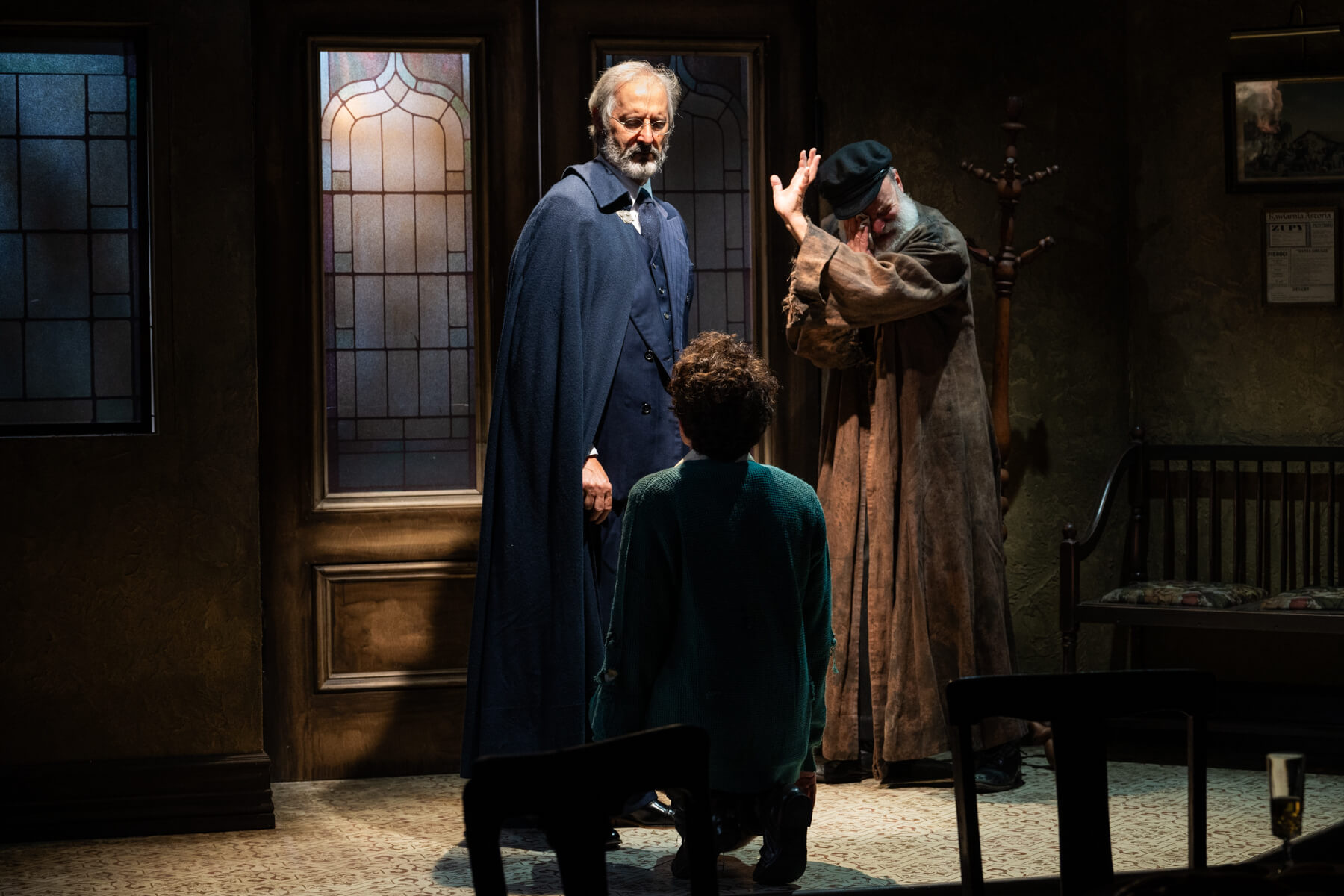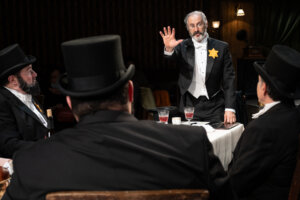A polarizing tale of the Lodz Ghetto, retold as horror story and farce
In Leslie Epstein’s ‘King of the Jews,’ a fine ensemble and immersive atmosphere save a problematic play

Graphic by Angelie Zaslavsky
In a Lodz nightclub in 1939, a group of Jewish waiters, musicians and rabbis must assemble a frightful minyan, deciding on 10 people to oversee their coreligionists and form a ghetto on the orders of the Third Reich. In the midst of this nightmare, there’s a moment of classic slapstick.
A waiter enters with a tray of poppy seed rolls, and as a crowd dashes for the exit, having witnessed a grotesque humiliation in the street, they collide and the rolls go flying. Seconds later, gunshots sound in the alley outside.
This moment comes early on in King of the Jews, Leslie Epstein’s stage adaptation of his polarizing 1979 novel, which Ruth Wisse, more than a bit unfairly, savaged for its resemblance to farce set amid the Shoah.
In Commentary, Wisse tore into the book’s “stylized theatrical staging”; it’s curious that, in an actual staged production, much of this style, and the gallows humor of the ghetto, has been diluted or, at the very least, does not land its comedic punches.
Divided into two acts that play out in real time, Epstein’s narrative, inspired by the figure of Mordechai Chaim Rumkowski, the Lodz Ghetto elder who fancied himself the patron protector of his city’s Jews but was in fact a power-mad functionary of Nazi genocide, is more contained than in his novel. Set in the Astoria Cafe, where the audience is treated to a pre-show jazz combo and has the option of sitting at cabaret tables on Lauren Halpern’s impressive, wall-to-wall period set, the show owes something of a debt to Casablanca, a film penned by Epstein’s father, Phillip, and uncle Julius. In plot, it resembles Jean Genet’s The Balcony, in which a cast of misfit brothel patrons rise to wear the new clothes of emperors and generals in an ersatz government.
When F.X. Wohltat (Daniel Ohreskes, finding fresh, menacing mannerisms in the stock role of Nazi collaborator), orders the customers and staff of the cafe to command the fates of their fellow Jews, there is a lively debate over the ethical implications.
Two raggedy rabbis, played by Allan Lewis Rickman and Robert Zuckerman, offer Godot-esque, gin gimlet-eyed Talmud. Schpitallnik (Jonathan Spivery, also the show’s musical director), a stammering refugee from Budapest, offers excuses. Finally, a Lithuanian doctor, Gotterman (Richard Topol, magnetic as he is repugnant), insists that they must get their hands dirty to save a child hiding among them.
“If we make the choices, we can divert the river of their wrath — away from this boy and from all our little ones,” Gotterman says, a haunting reversal of Rumkowski’s infamous plea for Jewish parents to “give me your children” so that they might be sent to Chelmno.

Gotterman, who in the book is called Trumpelman, a name wisely nixed for a post-Trump world, should be and ultimately becomes the show’s focus as head of the Judenrat, but the constant presence of the ensemble, all excellent in accented English, make his arc and its tortured contortions difficult to track. Beginning the action with a messiah complex, and immediately claiming another man’s wife (torch singer Phelia Lubliver, played by Rachel Botchan), he is hard to accept either as antihero or tragic figure.
When we arrive in Act II, with the Judenrat convened in white tie and tails by costume designer Oana Botez, we miss Gotterman’s slow transition from reluctant Nazi accomplice to moral monster. During intermission he has become irredeemable in his office as elder, and it is only the others, notably the young cellist turned minister of security, Dorka Kleinweiss (Erica Spyres), who negotiate to save as many Jews as they can.
As in his novel, Epstein peppers the drama with authentic jokes from the ghetto, and under Alexandra Aron’s direction, the cast is diligent in injecting some physical comedy into this devil’s bargain. But the pivot from discussions of deportation to Yiddishe one-liners is so breakneck that the audience on Thursday was loath to laugh. The banality, and occasional inanity, of this evil is better realized with a straight face.
For all the show’s problems — and some, like the exclusively euphemistic references to Nazis as “the Blond Ones” were in the original text — it affords audiences sitting amid the action an intimacy that invites post-show discussion if not quite a sense of complicity.
Though its core dilemmas cede ground to the machinations of plot or creaky punchlines, the staging and the force of the performances make for a compelling night at the theater that can tide you over till the immersive Cabaret arrives on Broadway from London next year.
If Epstein’s novel was ahead of its time for mingling hilarity and horrors, the story is almost too safe today in a world of Oscar darlings Jojo Rabbit and Life is Beautiful. It’s a credit to Epstein’s vision that we can register the absurdity of the Lodz Ghetto without a queasy feeling, even if the comedy, too infrequent and unclear in execution, doesn’t work.
Timing is everything, but maybe the airborne dinner rolls should have arrived before the pogrom, not in the middle of it.
The play King of the Jews is running at the HERE Arts Center through Nov. 18. Tickets and more information are available.
























